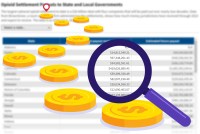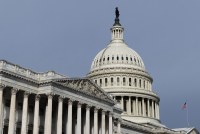Opioid Cash Grab: As Federal Funding Dries Up, States Turn to Settlement Money
Nevada’s budget debate highlights how uncertainty over funding for federal safety net programs may lead some officials to turn to opioid settlement dollars to make up the difference.
An Ice Rink To Fight Opioid Crisis: Drug-Free Fun vs. Misuse of Settlement Cash
A decision about how to spend settlement funds in Carter County, Kentucky, which was hit hard by the opioid epidemic, offers a window into the choices that surround this windfall.
How Are States Spending Opioid Settlement Cash? We Built a Database of Answers
From addiction treatment to toy robot ambulances, we uncovered how billions in opioid settlement funds were used by state and local governments in 2022 and 2023. Find out where the money went.
Are States Keeping Their Promises on Opioid Settlement Transparency?
It’s been about two years since most states began receiving millions of dollars in opioid settlement payments from companies that made or distributed prescription painkillers. But whether you can track how that windfall has been spent depends largely on where you live. That’s because there is no federal standard dictating the information that must be […]
12 States Promised To Open the Books on Their Opioid Settlement Funds. We Checked Up on Them.
Victims of the opioid crisis, health advocates, and public policy experts have repeatedly called on state and local governments to transparently report how they’re using the funds they are receiving from settlements with opioid makers and distributors.
Public Voices Often Ignored in States’ Opioid Settlement Money Decisions
In many places, victims of the opioid epidemic are silenced in decision-making about how to use opioid settlement money, a first-of-its-kind survey conducted by KFF Health News and Spotlight PA found.
A Call to Action Reignites Debate Over Opioid Settlements
State and local governments have received more than $7.5 billion in opioid settlement funds to date, and everyone’s lining up to have their say in how it’s spent. Of course, that means there’s also plenty of controversy. The latest development comes this morning, as a coalition of 192 recovery and harm reduction organizations across dozens […]
Lifesaving Drugs and Police Projects Mark First Use of Opioid Settlement Cash in California
California is in line for more than $4 billion in opioid settlement funds, and local governments are most often spending the first tranche of money on lifesaving drugs. An exclusive KFF Health News analysis also found projects to help police deter youths’ drug use and counsel officers who witness overdoses.
Supreme Court Upends Purdue Pharma Opioid Settlement
The court struck down a $6 billion bankruptcy plan from Purdue Pharma, the maker of OxyContin. What does this mean? We’ll explain.
Tribal Nations Invest Opioid Settlement Funds in Traditional Healing To Treat Addiction
Hundreds of Native American tribes are getting money from settlements with companies that made or sold prescription painkillers. Some are investing it in sweat lodges, statistical models, and insurance-billing staffers.
Why Opioid Settlement Money Is Paying County Employees’ Salaries
More than $4.3 billion in opioid settlement money has landed in the hands of city, county and state officials to date — with billions more on the way. But instead of using the cash to add desperately needed treatment, recovery and prevention services, some places are using it to replace existing funding. Local officials say […]
Swap Funds or Add Services? Use of Opioid Settlement Cash Sparks Strong Disagreements
The national opioid settlements don’t prohibit using money for initiatives already supported by other means, but doing so could dilute the impact.
Track Opioid Settlement Payouts — To the Cent — In Your Community
Want to know how much opioid settlement money your city, county, or state has received so far? Or how much it’s expecting in the future? Use our new searchable database to find out.
Statistical Models vs. Front-Line Workers: Who Knows Best How to Spend Opioid Settlement Cash?
A mathematical model designed to direct spending of opioid settlement funds is at the center of a debate over whether to invest in technology to guide long-term decisions or focus on the immediate needs of people in addiction.
Federal Lawmakers Take First Steps Toward Oversight of $50 Billion in Opioid Settlements
The four-page bill lists how states should spend settlement money, but it doesn’t specify consequences for flouting the rules or name who is in charge of monitoring compliance.
The Year in Opioid Settlements: 5 Things You Need to Know
In the past year, opioid settlement money has gone from an emerging funding stream for which people had lofty but uncertain aspirations to a coveted pot of billions being invested in remediation efforts. Here are some important and evolving factors to watch going forward.
‘They See a Cash Cow’: Corporations Could Consume $50 Billion of Opioid Settlements
As opioid settlement dollars land in government coffers, a swarm of businesses are positioning themselves to profit from the windfall. But will their potential gains come at the expense of the settlements’ intended purpose — to remediate the effects of the opioid epidemic?
Millions in Opioid Settlement Funds Sit Untouched as Overdose Deaths Rise
Some states haven’t begun using opioid settlement funds intended to help curb the opioid epidemic. Meanwhile, more than 100,000 Americans died of an overdose last year.
Watch and Listen: Opioid Settlement Case Triggers Protests Outside the High Court
The Supreme Court heard arguments over whether the Sacklers, the family behind Purdue Pharma — which marketed OxyContin — could claim immunity from future lawsuits without claiming bankruptcy.
Gubernatorial Candidates Tout Opioid Settlements
Tuesday’s election served as a testing ground for themes that could resonate with voters in 2024. Abortion is obviously among the biggest. One that’s not getting as much attention as it deserves: opioid settlement money. In Kentucky, both the newly reelected Democratic governor, Andy Beshear, and his Republican challenger, Attorney General Daniel Cameron, were involved […]

























